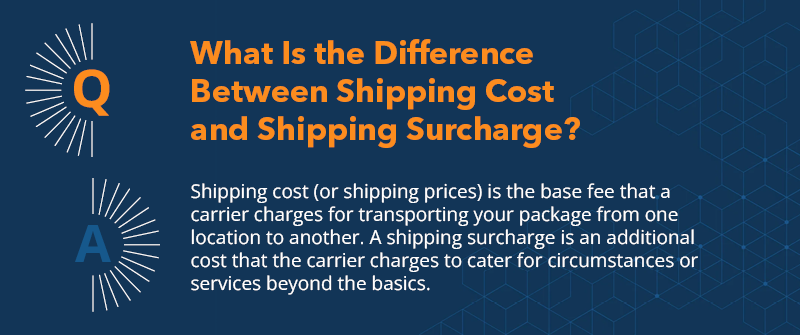What Are the Most Common Types of Shipping Surcharges?
August 17, 2023 •Chase Flashman

Shipping surcharges are a hot topic due to their impact on businesses and consumers amidst rising costs and e-commerce demand. In this blog, we explore the world of shipping surcharges and gain insights into the most common types that impact businesses. Discover how these additional fees can influence your shipping costs.
What Is A Shipping Surcharge?
Shipping surcharges are additional fees imposed by shipping carriers on top of the standard shipping costs. These surcharges are applied by shipping companies to compensate for specific factors or circumstances that go beyond the usual shipping services, such as fuel price fluctuations, delivery to remote locations, oversized packages, or seasonal demands.
Whether you pay a surcharge and how much you pay depends on the carrier you use, the service you choose, and your package specifics, among other factors.
What Is the Difference Between Shipping Cost and a Shipping Surcharge?
Shipping cost (or shipping prices) is the base fee that a carrier charges for transporting your package from one location to another. A shipping surcharge is an additional cost that the carrier charges to cater to circumstances or services beyond the basics.

Take for example, an online merchant who wants to ship a coffee maker to a customer. However, the customer lives in a remote location outside the UPS delivery area. In this situation, UPS will charge the merchant not only the standard shipping fee but also an additional surcharge known as the 'Destination Outside Service Area' fee. There might even be a UPS fuel surcharge added to the total cost as well.
While the shipping cost is determined by factors like package weight, size, and destination, surcharges are specific fees added on top of the base rate to account for unique situations or additional services provided during shipping. Still, shipping surcharges affect the overall shipping costs and can impact a company's bottom line. In fact, excessive shipping surcharges might become a big problem for small and medium businesses.
What Are the Most Common Types of Shipping Surcharges?
Given the similarity in their operations, most carriers charge similar surcharges. The most common surcharges and types of surcharges in shipping include fuel surcharge, hazardous materials surcharge, delivery area surcharge, oversized package surcharge, special handling surcharge, delivery reattempt surcharge, address correction surcharge, residential surcharge, remote area surcharge, and peak surcharge:
- Fuel Surcharge: A variable fee based on fluctuating fuel costs to offset the impact of rising fuel prices on shipping expenses.
- Hazardous Materials Surcharge: Imposed for handling and transporting dangerous goods that require special safety measures.
- Delivery Area Surcharge: Levied for deliveries to specific regions with unique challenges or limited accessibility.
- Overweight/Oversize Package Surcharge: Applied to packages exceeding standard size or weight limits, necessitating special handling and equipment.
- Special Handling: Additional fee for packages requiring unique care or attention during transportation due to fragility, sensitivity, or special instructions.
- Delivery Reattempt: Cost incurred when a package's initial delivery attempt is unsuccessful and needs to be re-delivered.
- Address Correction: Fee applied to rectify address errors or incomplete information provided, ensuring successful delivery.
- Residential Surcharge: Surcharge for delivering packages to residential addresses, compensating for added complexities.
- Remote Area Surcharge: Extra charge for delivering to distant or hard-to-reach locations, requiring additional logistical efforts.
- Extended Area Surcharge: Added cost for areas beyond the carrier's standard pickup and delivery zones.
- Reroute of Shipment: Fee for changing the destination address of a package after it has already been shipped.
- Peak surcharge: Temporary additional fee during high-demand periods, such as holidays or peak shipping seasons.
- Address correction: Fee incurred when a package's destination address needs to be corrected to ensure successful delivery.
Other common shipping surcharges can include overnight shipping surcharges, residential delivery surcharges, Saturday delivery surcharges, weekend delivery surcharges, additional handling surcharges, and expedited delivery surcharges.
For more details about different types of surcharges, check out FedEx Additional Shipping Fees and UPS Surcharges.
What Is a Surcharge Fee For?
A surcharge fee is imposed by shipping carriers to cover exceptional or unexpected costs that go beyond the standard shipping process.
They help to compensate the carrier for expenses arising from circumstances like fluctuating fuel prices, additional handling required for oversized packages, or the logistical complexities of delivering to remote or difficult-to-access locations.
Why Is a Shipping Surcharge Charged?
A surcharge is charged on a shipment in order to offset additional expenses that the carrier may incur while delivering your package.
For example, fuel surcharges help carriers cope with volatile fuel prices, while residential delivery surcharges account for the added complexities and time required for delivering to residential addresses.
Surcharges allow carriers to adapt to changing market conditions and maintain service quality while ensuring they can handle unique shipping scenarios without compromising their overall pricing structure.
How ShipSigma Can Help Reduce Your Shipping Surcharges
For many businesses, their goal is to reduce shipping surcharges and overall shipping fees.
Armed with industry-leading proprietary technology and 250+ years of industry experience, ShipSigma has saved customers over $100 million in shipping costs.
Now it’s your turn to enjoy lower rates on small parcel shipping! Contact us today, and let’s get to work optimizing your contracts.

